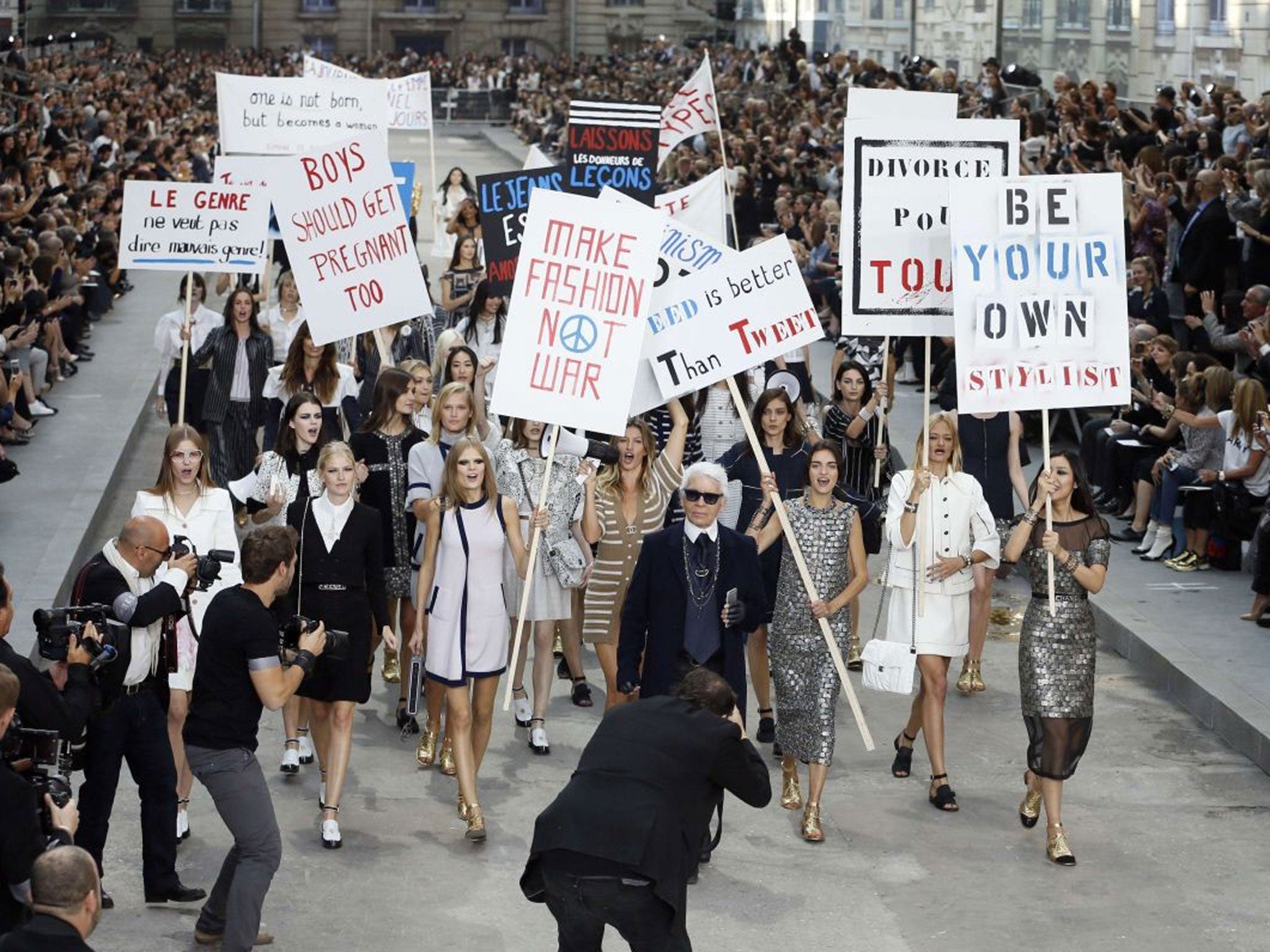Karl Lagerfeld's latest Chanel show might have dressed itself up in feminism, but it was more embarrassing than empowering
When will superficially appropriating the women's rights movement go out of fashion?

Karl Lagerfeld’s latest Chanel show ended with something resembling a feminist protest. Debuting the label’s Spring/Summer 2015 collection, the show took place in a fake Parisian boulevard constructed within the city’s Grand Palais. The clothing itself looked to the 1970s for aesthetic influence, an era which also saw huge progress for feminism and many real protests to boot.
Unfortunately, the feminist protest staged at the end of the Chanel show was deployed just as lightly as an oversized collar, a kitschy flared trouser or a garish psychedelic print. Waifish models stomped down the catwalk with placards bearing messages such as “FREE FREEDOM” and “LADIES FIRST”. Considering Karl Lagerfeld’s reputation as a misogynist who worships at the cult of skinniness, something seemed awry.
Lagerfeld, the 81-year-old who has been Chanel’s creative director since 1983 and came under fire in 2012 for calling Adele “too fat”, has spent his career selling women a false ideal of wealthy, skinny beauty. While his clothes are often remarkable in their craft, the parade of high-budget shows in which they appear are unabashedly focussed on generating profit and supplying the rich minority with obscenely priced outfits. The show in question was no exception.
Considering the speed at which Emma Watson’s He For She speech went viral, it’s easy to imagine that Lagerfeld (or one of his black-clad employees) conceived of the finale as a publicity stunt, sure to get iPhone cameras flashing and Instagram feeds raging. This apparent attempt to raise awareness for feminism might have seemed admirable were it not accompanied by the usual parade of stick-thin, largely white models.
While it’s easy to blame the fashion industry at large for this unrepresentative ideal, a designer of Lagerfeld’s influence has the power to hire girls of all body shapes, and could cause real change if he did so. Presented as it was, his feminist protest was as flimsy as the fake Parisian streets in which it was staged. Amongst the protest’s slogans were “BE YOUR OWN STYLIST” and “BE DIFFERENT”. Confusingly, the models holding them were dressed by a heavy-bellied old man whose daily uniform references a bygone era of stiff-collared patriarchy.
In 2014, the word “feminism” passes many people’s lips like the name of an ephemeral fashion trend, and the Chanel show demonstrates that it is being treated as such. Suddenly it's cool to identify as a feminist, but not to explore what it actually means. Beyoncé’s brand of hyper-choreographed empowerment, for example, was an immediate hit, despite her sample of Chimamanda Ngozi’s TEDx talk being placed alongside the distinctly ani-feminist lyric “bow down bitches”.
Perhaps this charade will at least provoke some deeper thought around the issue, and spark an interest in those who have never explored it before. You can only hold out hope. Yet the immediate reaction to the show by its audience – plastering it across social media feeds, declaring it revolutionary and then hurrying to the next show – seems hardly enough to instigate any actual social, political or economic change in society.
As history shows us, fashion really does have the power to make such changes: Coco Chanel herself emancipated women from the restrictive corsetry and heavy ornamentation of previous centuries, giving them freedom to move and work. Unfortunately, Lagerfeld seems more concerned that his collections will continue to line the wardrobes of wealthy patrons than whether they’ll help to close the pay gap. His stagey rendition of feminist empowerment was a gimmick, and too many people are willing to buy into it.
Join our commenting forum
Join thought-provoking conversations, follow other Independent readers and see their replies
Comments